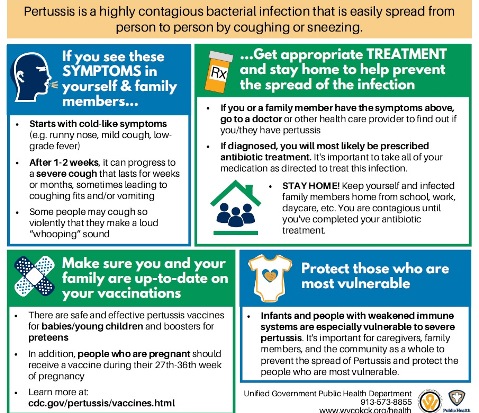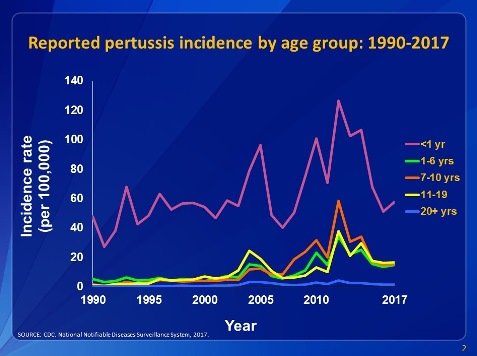
The Unified Government Health Department is reporting an increase in the number of whooping cough cases.
“We are seeing more than what we’ve seen in the previous past five years,” a spokesman for the Health Department stated.
However, exact numbers of cases were unavailable because they are still collecting information and because of patient confidentiality, she said.
“At this point we are not able to share an exact number of cases,” said Elizabeth Groenweghe, chief epidemiologist at the UG Public Health Department. “Typically we see about 15-20 cases of pertussis in Wyandotte County each year and so far for 2019 we have seen substantially more than that. This is the largest number of cases reported to us in the last five years.”
According to Groenweghe, the Kansas Department of Health and Environment has seen an increase in pertussis in other counties in Kansas, but the exact numbers and the amount of increase across the state are not available.
Nationwide, the Centers for Disease Control reported 18,975 pertussis cases in 2017 and 13,439 cases in 2018, according to the latest figures available on the CDC website. There were 10 deaths reported from pertussis nationally in 2018, with four of them under 1 year old.
The CDC’s website stated Kansas reported 122 cases of pertussis with 4.19 cases per 100,000 persons for 2017.
Residents here are being advised to take steps to prevent the spread of whooping cough.
“Pertussis can be very contagious and especially serious in young babies,” Groenweghe said. “If you suspect you or your child may have pertussis, it is important to get evaluated by a doctor or other health care provider.”
According to health officials, whooping cough is a highly contagious bacterial infection easily spread from person to person by coughing or sneezing.
Early symptoms include a runny nose, mild cough and low-grade fever, according to officials. It can progress to a severe cough after one or two weeks, and the cough could last weeks or months. Sometimes the cough leads to coughing fits or vomiting, or both. Some persons with pertussis may cough so violently that they make a loud “whooping” sound, according to officials.
While anyone may get pertussis, it can be very dangerous for infants and people with weakened immune systems, officials stated. Family members with pertussis, especially siblings and parents, may spread pertussis to newborns.
Persons who have been diagnosed with pertussis and their family members should remain home from all activities, including work, school and day care, until they have completed the prescribed antibiotics to treat pertussis, officials stated. Those who have pertussis are contagious for three weeks after the cough starts or until they complete antibiotic treatment.
The best way to prevent pertussis is to get vaccinated, officials stated. Safe and effective pertussis vaccines are available for babies and young children, and boosters for preteens. Also, pregnant women should receive a vaccine during their 27th to 36th weeks of pregnancy. Vaccinations are available at regular health care providers, at most clinics or at a local health department.
More information for individuals and families: https://www.cdc.gov/pertussis/about/index.html.
More information for medical providers: https://www.cdc.gov/pertussis/clinical/index.html.
To contact the UG Public Health Department, call 913-573-8855.

